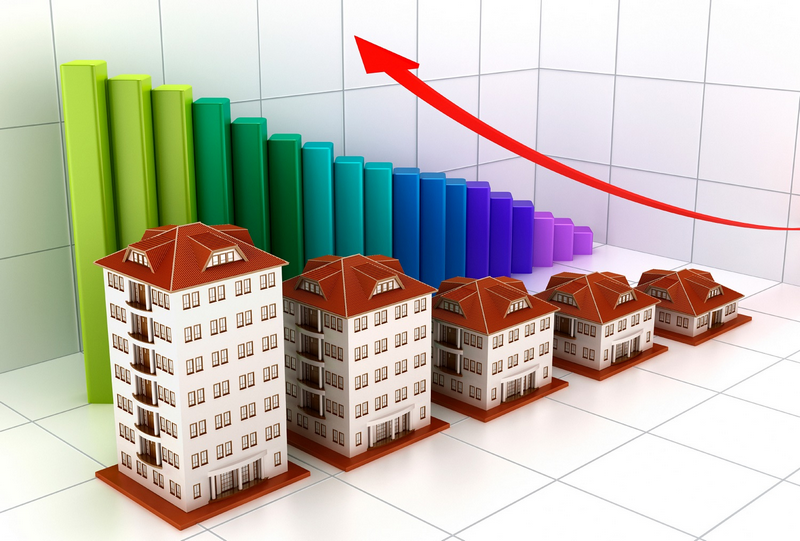As we navigate through the latter part of 2023, the question on everyone’s mind is whether the housing market is on the brink of a shift in 2024. With various factors stirring the pot, ranging from economic fluctuations to policy changes, it is crucial to understand what the future holds. This article delves into these aspects and provides a comprehensive forecast for the housing market in the coming year.
The current state of the housing market
The housing market has experienced a rollercoaster ride in recent years, primarily driven by the global pandemic and subsequent shifts in economic policies. As of late 2023, we see a market that is stabilizing from its post-pandemic upheaval. House prices have shown signs of plateauing after dramatic increases, and supply chain disruptions that plagued construction efforts are beginning to ease.
However, several noteworthy trends continue to shape the market, including increased interest rates and variations in housing demand across regions. Urban areas have seen a revival in housing demand, while suburban markets remain strong but are showing signs of cooling. These mixed signals make it challenging to predict the market’s exact direction, but they set the stage for a detailed examination of future possibilities.
- High Demand and Low Inventory: Many housing markets are experiencing high demand from buyers but low inventory of homes for sale, leading to increased competition and higher prices.
- Rising Home Prices: Home prices have been rising steadily due to strong demand and limited supply, making affordability a significant issue for many potential buyers.
- Low Mortgage Rates: Despite recent increases, mortgage rates remain relatively low compared to historical averages, encouraging buyers to enter the market.
- Shift to Suburban and Rural Areas: The COVID-19 pandemic has accelerated the trend of buyers moving from urban areas to suburban and rural locations, seeking more space and affordable housing.
- Increased Construction Costs: Rising costs of building materials and labor shortages are contributing to higher costs for new home construction, impacting the overall housing supply.
- Rental Market Pressures: The rental market is also facing challenges, with rising rents and increased demand for rental properties, particularly in urban areas.
- Regulatory and Policy Changes: Government policies and regulations, such as zoning laws and tax incentives, are influencing the housing market dynamics and availability of affordable housing.
- Investor Activity: Increased activity from real estate investors, including the purchase of single-family homes for rental purposes, is affecting the availability and pricing of homes for traditional buyers.

Economic factors influencing the market
The broader economic conditions play a significant role in shaping the housing market. Interest rates, inflation, and employment rates are just a few of the key factors that impact buyers’ purchasing power and overall market health. As of now, the Federal Reserve has hinted at potential interest rate hikes to combat inflation, which could have a cooling effect on the housing market.
Furthermore, economic recovery post-pandemic, while steady, is not uniform across all sectors. This uneven recovery may result in a bifurcated housing market where high-priced homes continue to see demand, whereas affordable housing struggles. The interplay of these economic factors will be critical in determining the market’s trajectory in 2024.
Policy changes and their potential impact
Government policies around housing can significantly alter the landscape. The introduction of new tax incentives, subsidies for first-time homebuyers, and relaxed zoning laws could bolster the market. On the flip side, stricter regulations and potential changes in property tax laws could dampen enthusiasm.
In 2024, several major policy shifts are anticipated. For instance, discussions around increasing housing affordability and addressing homelessness could lead to legislative moves that encourage the construction of affordable housing units. Additionally, green building initiatives could introduce new standards and possibly new costs for home construction, influencing both supply and demand dynamics.
The role of technology in the housing market
Technology continues to revolutionize the housing market. From how homes are marketed to virtual tours and blockchain in real estate transactions, tech advancements are playing a pivotal role. In 2024, we can expect further integration of technology, making transactions more seamless and helping buyers and sellers connect more efficiently.
One major trend is the rise of PropTech companies, which offer platforms that streamline property management, real estate investing, and home buying processes. Virtual reality (VR) and augmented reality (AR) technologies will likely become more mainstream, providing potential buyers with immersive home tours. These advancements could potentially accelerate transactions and reduce the time properties spend on the market.
Preparing for potential market shifts
With so many variables at play, it is essential for stakeholders to be prepared for any potential market shifts. Here are some steps to take:
- Keep an eye on economic indicators: Regularly monitor interest rates, inflation, and employment statistics.
- Stay informed about policy changes: Follow legislative updates that could impact the housing market.
- Embrace technology: Utilize new tools and platforms to stay competitive and efficient.
- Diversify investments: Consider a mix of high and low-end property investments to hedge against market volatility.
By staying proactive and informed, buyers, sellers, and investors can navigate the housing market more effectively in 2024.

Conclusion
While it is challenging to predict with certainty whether the housing market is on the brink of a significant shift in 2024, several indicators and trends suggest we are in for some changes. Economic factors, policy shifts, and technological advancements all play critical roles in shaping the future. By staying informed and prepared, stakeholders can better navigate the uncertainties and position themselves advantageously in the evolving market landscape.
FAQs
1. Will house prices drop in 2024?
It is hard to predict definitively, but if interest rates continue to rise, there could be a cooling in house prices. However, regional variations and economic factors will play significant roles.
2. Are there any policy changes expected that could impact the housing market?
Yes, potential policies aimed at increasing housing affordability and green building initiatives could introduce new dynamics into the market, impacting both supply and demand.
3. How will technology influence the housing market in 2024?
Technological advancements like virtual reality home tours, blockchain transactions, and PropTech platforms will likely make real estate transactions more efficient and accessible.
4. What economic indicators should I watch to gauge the housing market’s direction?
Key economic indicators include interest rates, inflation, and employment statistics. These factors significantly influence buyers’ purchasing power and overall market health.
5. What can investors do to prepare for market shifts?
Investors should diversify their property investments, stay informed about economic and policy changes, and embrace technological tools to stay competitive and efficient.




